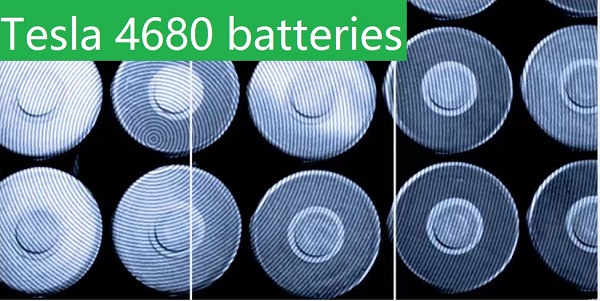Recently, Panasonic officially revealed to the media that it has delivered samples of the new 4680 cylindrical battery cells to Tesla, and began a lot of preparations before mass production.
4680 battery boom
At present, global mainstream battery companies including CATL are actively following up the layout of large cylindrical batteries including 4680.
According to the report, Tesla is expecting Panasonic to mass produce 4680 batteries to power new cars such as Tesla’s electric pickup, the Cybertruck, which is scheduled to be mass-produced in 2023.
Tesla said it has received samples of Panasonic’s 4680 batteries.

Tesla ‘partner’ will deliver 4680 batteries
Panasonic & 4680 batteries
It is understood that Panasonic has started small-scale trial production of 4680 lithium battery cells in May this year, and plans to enter large-scale mass production operations from April 2023, when it will be able to supply Tesla’s expected annual capacity of 10GWh 4680 lithium battery cells which can meet the installed demand of about 150,000 electric vehicles.
“The new vehicle battery will be mass-produced in Wakayama Prefecture as soon as 2023 to supply it to the North American market.” Panasonic said, “Battery capacity is expected to increase from about 50GWh currently to about 200GWh”
Earlier, Panasonic CEO said in April that he would invest in the future in automotive power lithium batteries, the goal is to expand the production capacity of EV lithium batteries by 3-4 times in 2028 and mainly focus on the North American market, the company is discussing which U.S. state it will build its new battery plant in.
According to official data from Tesla, it delivered 310,000 new cars in the first quarter of this year, an increase of 68% compared with 184,900 in the same period last year. Among them, Model 3s and Model Ys accounted for 95% of deliveries.
Tesla CEO Elon Musk said on the earnings call that in 2022 Tesla is confident that it will achieve at least 50% growth on the basis of 2021 and should be able to produce 1.5 million vehicles
Tesla & 4680 batteries
Tesla has high hopes for the 4680 lithium battery, the huge increase in car sales has also increased Tesla’s demand for lithium batteries. Tesla has high hopes for the 4680 lithium battery. According to previous reports, in April this year, Tesla began to deliver Model Y from its new Texas factory.
At the Cyber Rodeo opening event, Tesla delivered the first batch of cars equipped with 4680 self-developed lithium battery cells.
Musk said that Tesla delivered the first electric vehicles equipped with self-produced 4680 lithium batteries, which is an important milestone.
Later this year, its Texas plant is expected to be able to produce Model Y using both 4680 structured lithium battery packs and 2170 unstructured lithium battery packs.
At the same time, its Berlin plant will also achieve the co-production of the 2170 and 4680 lithium batteries.
“Tesla’s Texas factory will become the world’s largest battery factory in the future. It is estimated that by the end of 2022, the company’s 4680 battery production capacity will reach 100GWh per year, which can meet the needs of 1.3 million electric vehicles.” Musk said.
High nickel cathode & silicon carbon anode
At present, Tesla’s 4680 lithium battery uses high nickel cathode electrode plus silicon carbon anode electrode material, as well as tab-free technology, the energy density reaches 300Wh/kg, the battery capacity is increased by 5 times and the output power is increased by 6 times compared with the current solution.
The range of the car can be increased by 16%, and the cost per kilowatt-hour of the battery can be reduced by 14%.
According to industry forecasts, the production of 4680 lithium batteries is expected to accelerate in the next few years. Referring to the replacement rhythm of 21700 to 18650 batteries, terminal OEMs using 4680 batteries are also expected to gradually extend from Tesla to high-class electric vehicle manufacturers including BMW and Daimler.
Many battery companies are optimistic about 4680 and other large cylindrical lithium batteries, and will use full-tab large cylindrical lithium batteries as the core flagship product for the high-class vehicle market.
Some manufacturers’ full-tab technology large cylindrical power lithium batteries have entered the stage of mass pilot production, the development progress and sample verifying results are in line with expectations.
46 series cylindrical lithium batteries (4680 and 4695 lithium batteries) have outstanding safety, economical, non-deformation and other characteristics, and are expected to become the ultimate technical direction of power batteries.
Some companies have built 4680 and 4695 large cylindrical lithium battery production lines. It has become one of the first production bases in the world to mass-produce 4680 and 4695 large cylindrical lithium batteries.
BMW & cylindrical batteries
BMW is considering using cylindrical batteries from CATL in new electric platforms starting in 2025, in the future, the application potential of large cylindrical lithium batteries is great. The three types of battery market may account for 40% of prismatic lithium batteries, 30% of pouch lithium batteries, and 20-30% of cylindrical lithium batteries.
Compared with 21700, the current large cylindrical lithium battery has subversive innovation in design and production process craftmanship.
The 40135 lithium battery is basically similar to the lithium 4680 battery in structure, but the size and electrochemical system are different.
Many customers are interested in full-tab lithium batteries, the purchase intention is mainly in the fields of energy storage systems, low-speed electric vehicles and two-wheelers. Some companies plans to expand the production capacity of large cylindrical lithium batteries for such purposes.
It is worth noting that the 4680 battery has been improved in structure and material system. Analysts believe that the rapid growth of its output will drive the demand for new materials to increase.
It is expected that by 2025, the demand for high nickel cathode / silicon carbon anode / LiFSI / lithium supplement/conductive agent/PVDF will reach 39.1/16.3/2.0/1.2/1.9/31,000 tons respectively.





